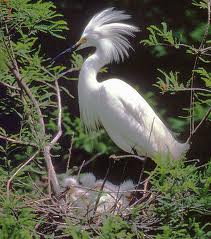I’m celebrating the Weeks-McLean Law, passed 100 years ago today, commonly referred to as the Migratory Bird Act. Today, I’m also celebrating what would have been my dad’s 86th birthday. Malcolm Dennison McLean, this one’s for you.
The Migratory Bird Act, passed in 1913, makes it illegal to kill or transport migratory birds for their feathers or any other reason. Imperiled snowy egrets, whose feathers were used to decorate lady’s hats in the period after the Civil War, were the poster birds for the Weeks-McLean Law, but they weren’t alone. In 1886, there were 50 different species of birds in the US being slaughtered for their feathers for the hat trade.
 What connection does my dad have with birds and the Migratory Bird Act? His wider connection, as a forester, was with the great outdoors. But on top of that, he was an eminently sensible man. He wouldn’t see the benefit in leaving nests full of baby egrets to starve, even if their mom’s feathers brought lots of money. He didn’t like waste or vanity. He enjoyed nature right where it was, outside.
What connection does my dad have with birds and the Migratory Bird Act? His wider connection, as a forester, was with the great outdoors. But on top of that, he was an eminently sensible man. He wouldn’t see the benefit in leaving nests full of baby egrets to starve, even if their mom’s feathers brought lots of money. He didn’t like waste or vanity. He enjoyed nature right where it was, outside.
My dad was a hunter, but only of what he could eat. And that changed. When we were kids, we enjoyed many a woodcock pie. (Woodcocks are elusive little game birds. Game birds are not covered by the Migratory Bird Act.) When dad noticed that the early spring didn’t bring as many whistling displays, he stopped hunting woodcock. He didn’t hunt harder, to get the last few birds. He changed.
Change came to the plume trade in the form of irate ladies of wealth. It took about 17 years for two Boston cousins, Harriet Hemenway and Minna Hall, to lead the boycotts and protests of feathered hats. They were reformed fashion icons themselves, as members of Boston’s upper crust, and the club they formed to protect birds was called the Massachusetts Audubon Society. Audubon societys sprang up in many other states around the urgent need to protect birds from the plume trade.
 It’s amazing to think that 100 years ago, people had the courage to stand up to London and New York businesses that were making fortunes in feathers, and insist that the traffic stop. They did that both by law and by fashion, by making the wearing of feathers a careless and vulgar expression of tasteless vanity. They didn’t wait until every single egret was slaughtered.
It’s amazing to think that 100 years ago, people had the courage to stand up to London and New York businesses that were making fortunes in feathers, and insist that the traffic stop. They did that both by law and by fashion, by making the wearing of feathers a careless and vulgar expression of tasteless vanity. They didn’t wait until every single egret was slaughtered.
Happy birthday, Migratory Bird Act. Happy birthday, Weeks-McLean Law. The world is a much better place because people saw something they didn’t like, and took action. And happy birthday, Mac McLean. You brought an interest in nature and the outside to our family that is going strong in the third generation.